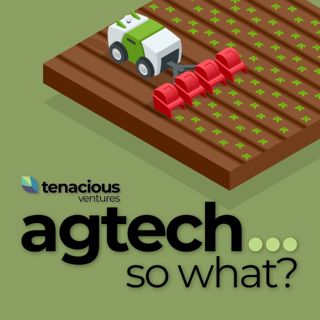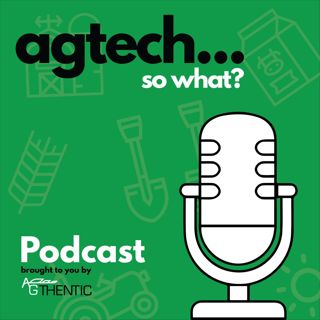
Disrupting the AgTech Ecosystem with Ron Adner
Longtime listeners have heard Sarah and Matthew talk about ideas like “ecosystem disruption” and “adoption chain risk” and “value architecture,” all of which stem from the works of Ron Adner. Ron is a...
11 Juni 202542min

Making Sense of Recent AgTech Acquisitions with Shane Thomas
Despite a persistent sense of uncertainty in the AgTech market lately, we’re still seeing startups get acquired– even if information about those acquisitions is opaque. Case in point: Syngenta recentl...
28 Maj 202535min

How GLP-1 Drugs are Reshaping the Food and Ag Landscape with Mary Shelman
Over the last few decades, a lot of products and technologies have promised to disrupt the diets and food buying habits of the world’s consumers. But nothing has made true on that promise quite like t...
14 Maj 202537min

Beyond VC: Redeemable Equity in AgTech with Connie Bowen
Big news from Tenacious– WE’RE HIRING! Do you share our mission of unlocking impact at scale in agri-food systems? Check out our open roles here. ...Is agtech a good fit for venture capital, and vice ...
30 Apr 202534min

Merging AgTech Startups to Multiply Value and Impact with Ron Hannam
Between COVID-19, Avian Influenza, and African Swine Fever, ordinary consumers are more aware than ever of the risks of infectious diseases on animal and human health, and to society at large. Ag tech...
16 Apr 202533min

Paying for Ag R&D When Consumers Won’t with Brooke Sauer of Boolah
For commercial farming operations, determining whether or not new tools, technology, and practices work can be a big undertaking. From install and setup costs to helping the team involved climb the le...
2 Apr 202536min

A Business Model for Novel Ingredients with Jake Berber At Prefer
For years the food tech space has been rife with companies eager to replace familiar standbys– from protein to sweeteners to colorings– with cheaper, more healthful, or more climate friendly alternati...
19 Mars 202535min

Solving for Adoption and Channel in AgTech… So what? with Shane Thomas
There are a few topics in agtech (and in the tech startup world more broadly) that are truly perennial– problems that must be solved again and again in new and innovative ways as markets, customers, a...
5 Mars 202536min






















